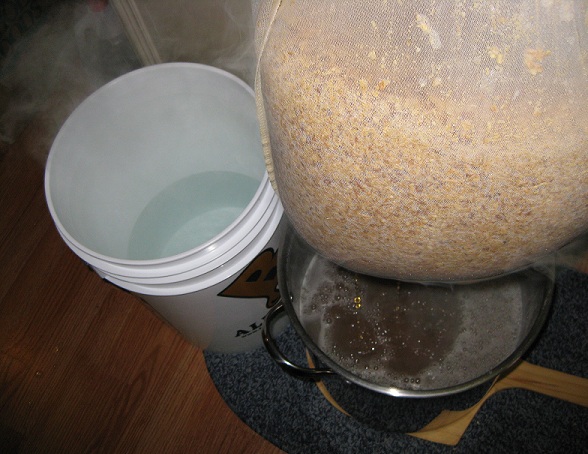I have done several AHS BIAB and they all come out great. I dont up the amount of grain at all. You will be fine.
And you have done them as the OP did or did you add anything to the process?

I have done several AHS BIAB and they all come out great. I dont up the amount of grain at all. You will be fine.
And you have done them as the OP did or did you add anything to the process?

Wait, you brew wort from all-grain, and can it for future use?












Yep, canned up some quarts of All Grain starter wort. It's a little bit of work up front, but the benefits will come later when I can grab a bottle pitch a vial of yeast without cooking anything.
Then there's the savings of not buying DME. I have about $1.50 worth of grain used to make 14 quart jars of sterile, ready to mix 1.040 wort. The BIAB method made it much easier and quicker to get my wort ready.
Yep, canned up some quarts of All Grain starter wort. It's a little bit of work up front, but the benefits will come later when I can grab a bottle pitch a vial of yeast without cooking anything.
Then there's the savings of not buying DME. I have about $1.50 worth of grain used to make 14 quart jars of sterile, ready to mix 1.040 wort. The BIAB method made it much easier and quicker to get my wort ready.
Weird...I was just going to start a thread about this. I really want to know how to do this. It seems so much easier to brew a big batch of 1.040 wort and can for future starters.
To make 14 quarts, did you start of with 4 gallons of water and 5 lbs of 2-row?
What is your process for jarring? I think I read somewhere that it was best to use a pressure cooker to get the jarred wort to over 250* to sterilize everything. Can this be done without a pressure cooker?

Okay, just finished my third BIAB all grain brew and I have some questions. I am using a 7.5 gallon kettle with voile paint strainer, as well as another 7.5 gallon kettle to sparge in. I will bring up about 4-5 gallons of water to mash temp, put in grains and mash for the requisite time. During this time, I bring kettle #2 to 170 degrees, then dunk the grain bag/squeeze it into the 2nd kettle after its done in the first. Combine and boil.
First question: I am seeing some very low SG's- is there something wrong with the technique that is causing me to miss the mark?
I think it may be the mill I got at my LHBS; just ordered my own mill- should I just run the grain through twice or just set the gap real low?
With my current kettle setup, is there any way to do higher gravity brews? My last recipe was an IPA with 16+ of grain, and it turned out very low. I have a similiar-sized dubbel waiting; should I just split it up and do two smaller mashes and then combine?
Thanks for your help.

What is your final volume after boiling and cooling the wort?
Using your own grain mill and crushing at a finer setting (or double crushing) should help a lot.
Keep some DME on hand so you can add it to your wort if you come in significantly under your target SG.
This batch was a bit off- in the 4.5 gal range. I did have some boilovers, though. That's a great idea with the DME- are you suggesting to add after the boil?
For the water/grain ratio- if I go on the high side at 2.5 qt/lb for my 16lb dubbel, that is 8 gallons. Should I just boil for longer to reduce this?
Well, I finally got around to doing my first BIAB (and all grain) this past weekend, with the addition of my new 10.5 gallon BK, new Bayou burner and new chiller. Surprisingly, it went without a hitch. My thermometer was acting goofy, so I'm not sure that I hit my temperatures perfectly (may have been a bit low). I was surprised, however, at the amazing heat retention of my BK, which held a constant mash temperature for 70 minutes (I stirred and took the temperature about every 5 minutes).
To top things off, my pre-boil gravity and OG were spot on with the recipe, and my efficiency ended up around 93%! I was amazed! She is now sitting in my office, vigorously fermenting, and life is good.
Adios, extract.
Now you're probably sitting there wondering why it took you so long to make the switch..
Yo Seven I can't believe you paid only 30 dollars for the turkey basket !! I found the exact one on Amazon for 72 freakin bucks that includes shipping !! Phew a bit pricey, everything else with your setup works great.I just need to find a cheaper basket.
Seven said:I got it on sale from sears.com last year just after the holidays. Keep your eyes open for good deals over the holidays!
Seven said:I got it on sale from sears.com last year just after the holidays. Keep your eyes open for good deals over the holidays!
Hey quick question I found a 40qt basket made by Winware on Amazon. In you opinion do you think it'll work? It's 29 dollars .
Here's what I use for helping to drain my grain bag:

It's a strainer intended for vegetables and such, with extendable arms for a sink. It supported my 10 lbs of wet grain very easily. I was able to squeeze the bag very easily (except that it was hot...).
I got 85% efficiency today.